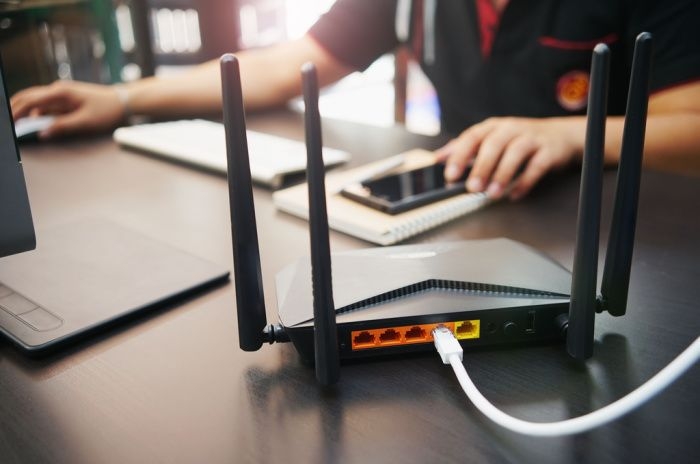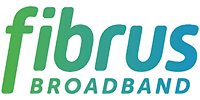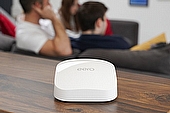1Gb broadband is now available to most homes around the UK, and the faster speeds can better support gaming, working from home, and multiple users.
Virgin Media Gig1 is well known, but there are also 1Gbps plans available from Sky, Vodafone, BT, TalkTalk and even budget-brand Plusnet.
The best gigabit broadband deals come with the latest WiFi 6 routers and free WiFi guarantees to ensure customers can experience the faster speeds they're paying for.

Can you get gigabit broadband?
Gigabit broadband is now the Government's over-arching target for future proofing the UK's broadband access, and the current aim is to reach 85% coverage in 2025, and nationwide coverage by 2030.
So far, Ofcom have reported over 25 million homes can now access gigabit-capable broadband, over 83% of the UK, as of late 2024. There's also an increasing number of households who have the choice of at least two full fibre networks - 7 million premises as of mid 2024.
Broadband analysts ThinkBroadband often publish data ahead of Ofcom however, and are already reporting gigabit coverage of 85.87% across the UK, suggesting the Government's 2025 target has already been met.
While coverage is being rapidly expanded by a number of different network operators, including Openreach, CityFibre and Nexfibre in partnership with Virgin Media, not everyone can get gigabit speeds just yet.
To find out if 1Gb broadband is available in your area, use the postcode search below to see the fastest broadband deals available to you.
How much does 1Gb broadband cost?
Gigabit broadband is currently priced between £38 and £50 per month from mainstream providers, although some smaller providers have deals available for as little as £25.
To see the latest pricing and special offers for gigabit broadband in your area use our full fibre broadband search, where you can search by postcode and then filter the deals by any personal preferences you have.
These are the four cheapest nationally available 1Gb deals available at the time of writing, but note that some areas may have cheaper deals than this, so it's worth using our free broadband tool to see exactly what's available where you live.
| Package | Broadband | Monthly price | Upfront price | Contract term | |
|---|---|---|---|---|---|
 |
Full Fibre 910 | 910Mb average | £31 | Free | 24 months |
 |
Gig1 Fibre Broadband | 1.13Gb average | £31.99 | Free | 24 months |
 |
Full Fibre 900 | 900Mb average | £31.99 | Free | 24 months |
 |
Full Fibre Gigafast | 900Mb average | £37 | £5 | 24 months |
Vodafone Full Fibre 910 is the cheapest, widely available, gigabit broadband deal at just £38 per month, and also includes a WiFi 6 router, plus additional discounts for Vodafone pay monthly mobile customers.
Other budget-friendly options include Virgin Media's Gig1 broadband, often delivered using their existing cable network to 60% of UK homes, and currently priced at just £39 per month.
Plusnet, one of the last providers to add a gigabit broadband deal to their line-up, also offer one of the most competitively priced packages at just under £40 per month.
Sky and Fibrely are also currently priced at £41 per month for new customers, although separate annual price rise amounts may apply.
While these are the current cheapest widely-available 1Gb deals, as we look at below, there are differences between exactly what each provider offers with their gigabit broadband packages. Some of these variations, like the included router for example, can make tangible differences to the end user experience, and so are worth considering.
It's also really worthwhile to check availability by area, as we've mentioned, some of the more upcoming full fibre networks have much more competitive pricing, for example here are some deals with more limited availability:
| Package | Broadband | Monthly price | Upfront price | Contract term | |
|---|---|---|---|---|---|
 |
Complete | 1Gb average | £32 | Free | 24 months |
 |
1Gbps Fibre Broadband | 920Mb average | £25 | Free | 24 months |
 |
Gigafast 900 | 900Mb average | £21.50 | Free | 24 months |
 |
Full Fibre 1000 | 982Mb average | Free for 3 mths, then £34.99 |
Free | 18 months |
Community Fibre has coverage across London, while Fibrus, a more rural provider, is available to a wide number of homes in Northern Ireland. Quickline is another rural provider focusing on rolling out in Yorkshire and Lincolnshire. While, Hey! Broadband, another competitively priced gigabit network focuses on urban towns in the South East of England.
So, it can vary widely exactly who may be available to your particular home.
Which provider is best for gigabit broadband?
Nearly every major broadband provider offers a gigabit broadband package these days, but there are differences between them.
Average download speed, upload speed and router all differ between gigabit packages. Some providers include their Wi-Fi guarantee for free on their fastest plans, while others are still chargeable extras.
Most gigabit broadband is now provided on full fibre to the home lines, which means any phone line, where offered, will be a digital voice line. However, some providers offer data-only lines with their full fibre packages and customers can't add a home phone at all.
Here are the main details of each major provider's gigabit broadband deal:
| Price from | Download speed | Upload speed | Router | WiFi guarantee | Phone line | |
|---|---|---|---|---|---|---|
| BT | £44.99 | 900Mb | 110Mb | WiFi 5 & Mesh | Optional (£10) | Optional |
| Plusnet | £39.99 | 900Mb | 115Mb | WiFi 5 | No | No |
| Virgin Media | £39 | 1.13Gb | 105Mb | WiFi 6 & Mesh | Included (30Mb) | Optional |
| Vodafone | £38 | 910Mb | 105Mb / 910Mb | WiFi 6 & Mesh | Optional (£8) | Included |
| TalkTalk | £45 | 944Mb | 110Mb | 2 x WiFi 6 & Mesh | Included | No |
| Sky | £41 | 900Mb | 90Mb | WiFi 6 & Mesh | Optional | Included |
Vodafone offer the fastest average gigabit download speed, with their new 1.6Gbps plan on the Openreach network. However, at the time of writing, it's still very expensive at £70 per month, compared to cheaper 1Gb plans, which cost from around £40.
Virgin Media's Gig1 plan, for example, currently costs just £39 per month, but includes their latest WiFi 6 enabled Hub 5 router, as well as their WiFi Max guarantee, worth £8 per month, so customers get up to three mesh WiFi extenders if they need them.
Other premium 1Gb deals include TalkTalk's Full Fibre 900 and Vodafone's Super WiFi or Pro II options. They both come with a WiFi 6 enabled router, as well as a WiFi guarantee with free WiFi boosters. While TalkTalk's gigabit deal is a data-only line, Vodafone customers get a phone line included with the option to upgrade to inclusive calls.
Sky are also a good option, with the UK's best customer service record, and the option for Sky Gigafast customers to take their WiFi Max add-on for just £4 extra per month to access a WiFi guarantee with up to three Plume WiFi pods.
Lastly, where Hyperoptic and Community Fibre are available, these independent networks offer some of the lowest price gigabit broadband in the UK. Availability is limited however, with Community Fibre focusing solely on London, and Hyperoptic limited to 64 towns and cities. Yet, both providers offer symmetrical 1Gb upload speeds, WiFi 6 routers, and low prices.
Overall, while gigabit broadband is still a premium product, our top choices are Virgin Media, Sky, TalkTalk, and Vodafone Super WiFi, simply because these deals offer extra services to ensure customers really get to experience those faster speeds at home.
Who offers 1Gb broadband?
Over the last couple of years we've seen an influx of Openreach resellers launching their full fibre and gigabit broadband deals, as well as the increased expansion of various independent networks.
While we summarised the gigafast packages on offer at the top of this page, we'll look at each provider in more detail here.
The notable exceptions to this list are budget providers NOW Broadband. However, they are owned by Sky, who does offer a gigabit broadband deal.
BT
BT and Openreach are both part of the BT Group of companies, and so BT gigabit broadband is provided on the Openreach FTTP network.
This means BT Full Fibre 900 is available to over 16 million premises at the time of writing.
| Package | Broadband | Monthly price | Upfront price | Contract term | |
|---|---|---|---|---|---|

|
Full Fibre 900 | 900Mb average | £35.99 | Free | 24 months |
BT Full Fibre 900 comes with the BT Smart Hub 2 router, it's a WiFi 5 router so it's not the most advance protocol, but it does support mesh, so it can be extended as part of BT's Complete WiFi service. The BT Smart Hub 2 has four gigabit LAN ports for wired connections.
Customers can choose to add a digital voice line, as well as upgrade to the Complete WiFi add-on for a guaranteed wireless connection throughout their home.
Community Fibre
Community Fibre have their own independent full fibre network that covers nearly all of the boroughs in London. However, they only have very limited presence outside of London in the South East.
They offer a gigabit broadband package with average download speeds of 920Mb.
| Package | Broadband | Monthly price | Upfront price | Contract term | |
|---|---|---|---|---|---|

|
1Gbps Fibre Broadband | 920Mb average | £25 | Free | 24 months |
Community Fibre's gigabit broadband package comes with the Linksys WiFi 6 Intelligent Mesh router which supports WiFi 6. It also offers 4 gigabit LAN ports for wired connections.
Their gigabit plan is currently one of the cheapest available at just £25 per month, and customers can choose to add a digital voice line, as well as access mesh WiFi extenders through their 'Premium WiFi' add-on.
Gigaclear
Focusing on rural areas specifically, Gigaclear operate their own independent full fibre network. Their Hyperfast 900 package offers average download speeds of 900Mb.
| Package | Broadband | Monthly price | Upfront price | Contract term | |
|---|---|---|---|---|---|

|
Hyperfast 900 | 900Mb average | £29 | Free | 18 months |
Because they install their own fibre optic cables and equipment, Gigaclear's speeds are symmetrical, with 900Mb average upload speeds too.
Availability is more limited, with coverage in rural areas such as Devon, Somerset, West Oxfordshire, Herefordshire, Gloucestershire, Berkshire, Essex, Northamptonshire and Wiltshire.
Hyperoptic
Hyperoptic's independent network focuses on bringing full fibre broadband to buildings like flats and apartment blocks, rather than individual houses. As a result, they're primarily found in urban towns and cities such as London, Manchester, Leeds, Birmingham, Glasgow, Cardiff, and Bristol.
| Package | Broadband | Monthly price | Upfront price | Contract term | |
|---|---|---|---|---|---|

|
Hyperfast (24 months) | 900Mb average | £29 | £19 | 24 months |
Hyperoptic's Hyperfast broadband package offers average download speeds of 900Mb and symmetrical upload speeds. Customers will receive a WiFi 6 router that also supports mesh, but the WiFi guarantee and mesh extenders will cost extra.
Customers can choose to upgrade to a digital home phone line, which comes with free evening & weekend calls.
KCOM
KCOM have been expanding their Lightstream network beyond their traditional area of Hull, providing full fibre broadband to areas in East Yorkshire and Lincolnshire.
Their Full Fibre 900 package offers average download speeds of 900Mb, with average upload speeds of 180Mb.
| Package | Broadband | Monthly price | Upfront price | Contract term | |
|---|---|---|---|---|---|

|
Full Fibre 900 | 900Mb average | £34.99 | Free | 24 months |
Plusnet
Plusnet have been the most recent provider to start offering gigabit-capable broadband, having previously only released full fibre plans up to 500Mb.
However, their Full Fibre 900 gigabit plan is now one of the best priced deals available:
| Package | Broadband | Monthly price | Upfront price | Contract term | |
|---|---|---|---|---|---|

|
Full Fibre 900 | 900Mb average | £31.99 | Free | 24 months |
Available on the Openreach network, Plusnet gigabit broadband covers over 16 million premises, and offers average download speeds of 900Mb per second.
Plusnet remain a budget choice however, with the low pricing meaning customers will miss out on the latest WiFi technology and won't have the option to add a voice line.
Sky
Sky offer a gigabit broadband deal on the Openreach FTTP network, which currently passes over 16 million premises across the UK.
Their Gigafast plan offers average download speeds of 900Mbps at peak times, and average upload speeds of 90Mbps. It's one of the most competitively priced gigabit broadband deals at just £41 per month:
| Package | Broadband | Monthly price | Upfront price | Contract term | |
|---|---|---|---|---|---|

|
Full Fibre Gigafast | 900Mb average | £37 | £5 | 24 months |
Sky's Gigafast plan now comes with the WiFi 6 enabled Sky Max Hub as standard, and customers can choose to upgrade to the WiFi Max add-on with up to three Plume WiFi extenders for an extra £4 per month.
WiFi Max also includes a WiFi guarantee of 25Mbps in every room.
TalkTalk
TalkTalk offer full fibre broadband over both Openreach FTTP and CityFibre networks, so they have slightly better coverage than BT, Sky, and Plusnet.
TalkTalk's Full Fibre 900 package offers the second fastest average download speeds at 944Mb, beaten only by Virgin Media.
| Package | Broadband | Monthly price | Upfront price | Contract term | |
|---|---|---|---|---|---|

|
Full Fibre 900 | 944Mb average | £45 | Free | 18 months |
For a low-cost provider TalkTalk offer a premium gigabit broadband package, with customers receiving two Amazon eero Pro 6 routers which support both WiFi 6 and mesh. However, TalkTalk only provide a data-only line, so there's no way to add a home phone.
Overall, TalkTalk are one of our top choices for gigabit broadband.
Virgin Media
Virgin Media currently have the widest availability for gigabit-capable broadband, now passing over 17.8 million premises.
Their Gig1 package also offers the fastest average download speeds, achieving 1.13Gb at peak times.
| Package | Broadband | Monthly price | Upfront price | Contract term | |
|---|---|---|---|---|---|

|
Gig1 Fibre Broadband | 1.13Gb average | £31.99 | Free | 24 months |
Virgin Media's Gig1 package comes with their latest Hub 5 router, which supports WiFi 6 and mesh, and their WiFi Max guarantee is included for free. WiFi Max promises minimum download speeds of 30Mb in every room. They also include a phone line with free calls at the weekends to UK landlines.
Overall, Virgin Media was one of our favourite providers for gigafast speeds.
Vodafone
Like TalkTalk, Vodafone offer full fibre broadband over both the Openreach FTTP and CityFibre networks, however their footprints don't match up entirely so it's possible customers may be able to get gigabit broadband from Vodafone but not TalkTalk, or vice versa, so it's always worth checking.
Vodafone offer three gigabit broadband options, but we're highlighting their Super WiFi and Pro II options because these come with the added extras that will enable customers to really benefit from gigafast speeds.
| Package | Broadband | Monthly price | Upfront price | Contract term | |
|---|---|---|---|---|---|

|
Full Fibre 910 | 910Mb average | £31 | Free | 24 months |

|
Full Fibre 910 + Super WiFi | 910Mb average | £36 | Free | 24 months |

|
Pro 3 Full Fibre 910 | 910Mb average | £40 | Free | 24 months |
Vodafone Super WiFi includes a WiFi 6 router with up to three WiFi 6 extenders, customers also get a phone line as standard too. Pro II is a little more expensive, but customers get an upgraded WiFi 6E router, with WiFi 6E extenders and an automatic mobile broadband back-up.
While customers can save a little more with their standard Vodafone Full Fibre 900 package, which does also come with a WiFi 6 router, the Super WiFi and Pro II upgrades are particularly worthwhile at the gigabit broadband tier.
What is gigabit broadband?
Gigabit broadband offers gigafast download speeds, with gigabit meaning 1000Mb (megabits), and 1000Mb equating to 1Gb, or 1 gigabit.
Broadband speeds are based on how much data is sent each second, which is why speeds can often be written as '1Gb per second', or '1Gbps'. So, a gigabit broadband package is capable of sending 1 gigabit of data every second, or 1,000Mb per second.
To put that into perspective, superfast fibre to the cabinet (FTTC) broadband plans which cover 98% of the UK offer speeds up to around 70Mb. Gigabit broadband therefore can download data almost 15 times faster than the fastest part fibre connections.
And while most people who've already made the switch to full fibre broadband are on 100Mb plans, gigabit deals are still ten times faster than these entry-level full fibre connections.
Speed variations
Because gigabit broadband is currently the top-tier, or fastest connection, full fibre broadband can often deliver, there are some variations in terms of actual speed experienced by the end user.
Openreach fibre to the premises (FTTP) for example, provides 1Gb broadband on its network, yet, the real-world average download speeds for this connection are around 900Mb.
A true gigabit broadband deal, for example, would usually have to provide 1.2Gbps speeds to then provide an end user average download speed of 1Gbps. This is precisely what CityFibre started offering for its resellers in October 2023.
Because Virgin Media operate a totally separate network to Openreach, with different cabling and technologies, their gigabit broadband plan, Gig1, offers average peak-time download speeds to end users of 1.13Gb per second.
Community Fibre also performs better than Openreach FTTP on their gigabit broadband plan, offering at least 50% of their customers average download speeds of 920Mbps at peak times.
Overall then, while we talk about gigabit broadband offering 1Gb connections, actual end user experience on these plans varies from 900Mb to just over 1Gb.
What can 1Gb broadband do?
1Gb broadband is more than four times faster than the UK's average download speed of 223Mb.
While actual broadband connections will be limited by what the router can support, gigabit broadband could theoretically support 100 devices all streaming connecting to the Internet at 10Mb each.
In addition to the capacity to support multiple devices at once, gigabit broadband can also download large files a lot quicker than superfast, or even ultrafast broadband.
Here are some examples of how quickly a gigabit broadband connection could download different file types, in comparison to superfast and ultrafast alternatives.
| Gigabit broadband (1Gb) | Ultrafast broadband (300Mb) | Superfast broadband (60Mb) | |
|---|---|---|---|
| 100 x 12MP photos (600MB) | 5 seconds | 16 seconds | 2 minutes |
| HD Movie (6GB) | 51 seconds | 3 minutes | 15 minutes |
| Ultra HD Movie (15GB) | 2 minutes | 7 minutes | 36 minutes |
| PS5 FIFA 23 (50GB) | 7 minutes | 24 minutes | 2 hours |
| Xbox Series X Assassin's Creed Valhalla (104GB) | 15 minutes | 50 minutes | 4 hours 10 minutes |
| PS5 Call of Duty Black Ops Cold War (220GB) | 32 minutes | 1 hour 45 minutes | 8 hours 45 minutes |
As file sizes get bigger, the difference in speed to download for gigabit broadband compared to the UK's current average of around 70Mb is vast.
In terms of the number of people who can use a gigabit broadband connection at once, the table below shows minimum speed requirements for different online activities, and how many devices could theoretically be supported by a gigabit connection.
| Minimum speed required (down / up) | Number of devices supported by 1Gb broadband | |
|---|---|---|
| Online streaming in 1080p HD | 5Mb | 200 |
| Online streaming in 4K UHD | 30Mb | 33 |
| Video calling in 1080p HD | 3Mb / 4Mb | 250* |
| Online gaming on the PS5 | 5Mb / 5Mb | 200* |
| Online gaming on Xbox Series X | 3Mb / 0.5Mb | 333 |
*Based on symmetrical upload speeds, so many gigabit broadband packages will be much less than this as those with asymmetrical speeds usually have much slower upload speeds.
It's interesting to note that some activities, like video calling and online gaming, are actually more limited by the available upload speed, than the download speed. This is one reason why providers offering symmetrical speeds like Hyperoptic and Community Fibre are so popular.
In the real world however, it will be less than this, due to among other factors, what the wireless router can support, as well as these calculations being based on absolute minimums.
Overall however, you can see how much capacity gigabit broadband has and how its main benefits lie in the ability for multiple people to get online at the same time without affecting each other.
How does gigabit broadband work?
Gigabit broadband is achieved by installing a fibre optic cable directly into a customer's home, so unlike fibre to the cabinet connections, there is no deterioration from a change in cabling to cover the final distance or connection to a customer's home.
This is why 1Gb broadband deals are often called fibre to the premises, or fibre to the home, connections.
Using Openreach as an example, they install the fibre optic cable directly into a modem installed inside a customer's home called a ONT box. From this box, an Ethernet cable is used to connect to a wireless router via its Ethernet WAN (wide area network) port, for example this could be the BT Home Hub.
At this stage customers can then choose to connect their devices to the router over the wireless network, but to really experience the 1Gb broadband speeds it's suggested customers should make use of the Gigabit LAN ports for the fastest connection.
Wireless gigabit broadband
Routers supplied with gigabit broadband deals will come with two to four gigabit LAN ports, which can be used to connect the router directly to a TV, gaming console, or computer with an ethernet cable. These gigabit ports will support the full 1Gb data transfer speeds, as well as improve on data response times with lower latency rates.
Some of the better gigabit broadband packages come with the latest WiFi 6 mesh routers, which can deliver speeds of up to around 920Mb in the real-world tests. WiFi 6 offers a notable upgrade over WiFi 5 that's found in the majority of provider-supplier routers. It offers faster throughput speeds utilising multiple channels, as well as up to 75% lower latency rates with more efficient data encoding and handling.
In fact, Intel even said WiFi 6 helps to bring wired and wireless connections closer and to bridge the gap for the first time. For anyone who knows how patchy wi-fi signals can be around a home, that's a big statement.
Looking for a gigabit broadband package that offers the latest WiFi 6 mesh router is worthwhile then, as some may still offer older WiFi 5 routers which won't allow customers to experience the best possible speeds over their wireless network.
One final note regarding WiFi 6 however, is that for the fastest speeds, the connecting device (e.g. the smartphone, tablet, laptop, or computer) also needs to support the WiFi 6 protocol. For any TV addicts, both Sky Glass and Sky Stream Puck support WiFi 6. In comparison, Virgin Media Stream box only supports WiFi 5.
Benefits
The biggest benefit of gigabit broadband is the increased capacity it offers, rather than the experience of gigafast speeds for any one particular activity.
In terms of raw speed, customers on a 1Gb broadband connection would be able to download a two-hour film in HD (6GB) in around 30 seconds, or a 100GB PS5 game in 15 minutes. However, the differences experienced on our daily Internet activities when multiple devices are connected are likely to be more noticeable.
Benefits of gigabit broadband include:
- Improved quality when multiple devices are online at the same time
- Higher quality video streaming
- Higher quality video calls
- Improved gaming experiences
For most households the headline 1Gb speed won't be the big draw because there are few instances where these speeds are absolutely necessary.
Yet, being able to stream HD in one room at the same time as cloud gaming in another, without any loss of quality or response time, is where gigabit broadband finds its place.
Drawbacks
There are a couple of drawbacks to gigabit broadband, or full fibre broadband in general.
These include:
- Some providers offer data-only lines without a home phone at all
- Where a phone line is offered, it's a digital line that will stop working in the event of a power cut without a battery backup.
- Gigabit speed benefits will often be lost over wireless networks to some degree, with most providers specifying average download speeds are only available over a wired connection.
- Pricing is fairly high, around the £40 to £50 per month mark, and providers are more focused on moving customers to full fibre than necessarily the top speeds. As a result, Ofcom aren't regulating gigabit pricing just yet because customers can choose slower speeds.
Phone lines
The rollout of full fibre broadband coincides with the planned closure of the copper telephone network. Unlike the phone line network however, full fibre broadband doesn't have its own power supply, so it will stop working during a power cut.
This means customers who've switched to full fibre will need to rely on either their mobile phones during a power cut, or they'll need to invest in a battery backup to keep their digital voice line connected instead.
Because of this limitation, many gigabit providers offer data-only lines, with no option to even add a digital voice line. Data-only full fibre is also cheaper on the wholesale level, so it helps to keep prices down to not offer a voice line as well.
Overall, if a phone line is important to you, look out for full fibre providers like BT, Sky, Vodafone, and Virgin Media who either include a phone line, or at least give customers the choice of adding one.
Wireless speeds
Because gigabit broadband is so fast, wireless technology is still playing catch-up to some extent. While it's true the latest WiFi 6 protocol should be able to support gigabit speeds, it's unlikely to achieve the maximum potential of the connection in comparison to a wired connection.
Providers often include in their terms and conditions that top speeds are only available via ethernet cabled connections, and the advertised average download speed is also based on a wired connection.
Community Fibre for example, even specify an "expected WiFi speed" alongside their gigabit broadband package, which is 400-650Mb, a fair jump down from the average download speed of 920Mb. This is despite offering an advanced WiFi 6 mesh router with their plan.
Overall, as we covered at the top of the page, customers need a good router to get the best gigabit broadband experience, so it's a good idea to look out specifically for providers that offer WiFi 6 and mesh supporting routers.
In addition, some even go one step further, like Virgin Media and TalkTalk, and include their WiFi guarantees for free for their gigafast customers. This is a very worthwhile perk for gigabit customers because it includes free mesh extenders to properly boost the wireless network throughout the home.
Pricing
Lastly, because the industry focus is set on achieving coverage of gigabit-capable broadband and moving customers onto full fibre, Ofcom is only regulating entry-level full fibre pricing. This means providers, including Openreach wholesale, can set gigabit broadband pricing however they want.
In addition, so far, take-up of gigabit broadband is still fairly low. Ofcom's 2024 Connected Nations report revealed only 17% of customers in a full fibre enabled area had taken a 1Gb package, with the majority (39%) of households signing up to an entry-level 100Mb plan.
All in all, these factors combine to mean pricing on gigabit broadband just isn't competitive at the moment, and so it's very much a premium product with a premium price tag.
While Openreach are reducing wholesale prices of their full fibre broadband, which came into effect in 2023, and we have seen prices reduce already, with some deals now starting to fall below £40 per month.
How fast is 1Gb broadband?
The real-world speed of a 1Gb broadband connection will vary between providers and full fibre networks. However, theoretically 1Gb offers 1 gigabit per second data transfer. So, in effect, a 1Gb connection should download 100GB of data in around 15 minutes.
That's pretty fast when you consider the average UK home broadband speed which is just under 60Mb, would take around 3 hours 58 minutes to download the same amount of data.
Due to advertising regulations that were bought in back in 2017, broadband providers can only advertise broadband speeds that at least 50% of their customers actually receive during the busiest times of the day, for broadband this is 8pm to 10pm.
In effect then, we have a fairly good indication of how fast 1Gb broadband is simply by looking at the advertised speeds of various gigafast packages because we now know this is what the majority of customers on that package are actually getting.
Here are four of the fastest gigabit broadband deals available:
| Package | Broadband | Monthly price | Upfront price | Contract term | |
|---|---|---|---|---|---|

|
Gig2 Fibre Broadband + Netflix | 2Gb average | £56.99 | Free | 24 months |

|
Pro 3 Full Fibre 1.6 | 1.6Gb average | £55 | Free | 24 months |

|
Gig1 Fibre Broadband | 1.13Gb average | £31.99 | Free | 24 months |

|
1Gbps Fibre Broadband | 920Mb average | £25 | Free | 24 months |
As you can see, there are some variations in the top speeds with the major difference between these providers being the network they use. TalkTalk and Vodafone for example both use CityFibre as well as Openreach to deliver their gigabit broadband.
Virgin Media operate their own independent network, which they finished upgrading to gigabit broadband speeds at the end of 2021. As a result, they're now the most widely available gigabit broadband provider, and fastest broadband in the UK.
To back up the advertised headline broadband speeds we can also look at independent research by Ofcom into real-world speeds experienced by customers.
In their latest report they included two gigabit broadband packages, Virgin Media's Gig1 and BT's 900Mb full fibre plan, and reported average download speeds across a panel base of 100 and 59 customers respectively.
| Average download speed peak time | Maximum download speed peak time | Minimum download speed peak time | |
|---|---|---|---|
| Virgin Media Gig1 | 1115.38Mb | 1129.48Mb | 1098.50Mb |
| BT FTTP 900Mb | 919.10Mb | 924.32Mb | 914.75Mb |
The maximum download speed for Virgin Media's Gig1 package over a 24-hour period was 1129.48Mb, while the maximum average speed for BT's gigabit plan was 924.32Mb.
In Ofcom's previous report, where Gig1 was first included, they reported an average download speed at peak times of 1,134.83Mb, so the speed has dropped very slightly in the latest research.
Overall however, Ofcom's independent research found even the minimum download speed experienced by Virgin Media and BT's gigabit customers on average was in excess of their advertised speeds.
Upload speeds
With faster download speeds you would also expect faster upload speeds, but for gigabit broadband that entirely depends on the network and the choice of the provider to how they limit uploads.
Here are the five fastest average upload speeds of gigabit packages:
| Upload speed (average) | Download speed (average) | |
|---|---|---|
| Community Fibre | 920Mb | 920Mb |
| Hyperoptic | 900Mb | 900Mb |
| Vodafone | 910Mb / 105Mb* | 910Mb |
| Virgin Media | 1130Mb / 104Mb** | 1130Mb |
| Plusnet | 115Mb | 900Mb |
*Vodafone upload speeds vary depending on whether a customer joins via the Openreach FTTP network (105Mb), or CityFibre network (910Mb).
**Virgin Media connections in Nexfibre areas offer customers the change to upgrade upload speeds to symmetrical for an extra £6 per month.
Virgin Media are notable in that their upload speeds are much slower in comparison to other gigabit-capable networks including Openreach FTTP. Their Gig1 package offers upload speeds of just 104Mb, despite having the fastest download speeds of 1.13Gb.
Some of the smaller independent networks, like Hyperoptic and Community Fibre, stand out for offering symmetrical uploads, which means their upload speeds are as fast as their headline download speeds.
However, more major providers are moving towards symmetrical speeds, with Virgin Media now offering these as an optional upgrade in Nexfibre areas, while Openreach is said to be launching a symmetrical 1Gb plan in April 2025 in select locations.
While most online activity involves downloading data, upload speeds might be noticeable for online gamers, high definition video calls, and for people who upload files for example when working on shared projects in the cloud.
Frequently Asked Questions
What is gigabit broadband?
Gigabit broadband offers 1Gb per second download speeds. This means 1Gb of data can be downloaded each second, in other words, a 200GB file, which is more than most PS5 games, could be downloaded in just 28 minutes.
1Gb is also the equivalent of 1,000Mb. Broadband providers must advertise download speeds that at least 50% of their customers actually receive at peak times. As such, gigabit broadband is often seen listed with 900Mb average download speeds, as this is the real-world speed gigabit broadband customers actually experience.
How much does 1Gb broadband cost?
1Gb broadband packages vary between around £40 and £50 per month, although there are deals available with full fibre providers for as little as £25 per month in London.
Ofcom have so far decided to leave gigabit broadband pricing without regulation, both because customers can choose to move to full fibre on slower packages, and also to help providers with the infrastructure costs of installing gigabit broadband around the UK. It may be some time then before we see pricing on gigabit broadband becoming more competitive.
Where is gigabit broadband available?
Gigabit-capable broadband is currently available to over 83% of the UK, and is on target to cover 85% in 2025, and all of the UK by 2030.
So far, the gigabit rollout has largely been thanks to Virgin Media upgrading their entire fibre network to gigabit-capable broadband speeds, which now covers 60% of the UK.
Openreach has also reached over 16 million premises so far as well, and is on target to cover 25 million premises by the end of 2026.
Use our postcode checker to find out if gigabit broadband is available in your area.
Is 1Gb broadband good for gaming?
Online gaming doesn't need gigafast speeds for users to get a good experience, with factors like latency affecting gameplay more than download speed.
However, 1Gb broadband can allow gamers to download large game files much quicker, with a really big PS5 game like Call of Duty Black Ops Cold War taking just 32 minutes to download.
1Gb broadband is also really good where multiple gamers want to play together at the same time from the same connection, as it's the capacity that gigabit broadband offers which is its major benefit.
Is 1Gb broadband worth getting?
1Gb broadband is worth getting for people living in large households where multiple occupants want to use the Internet at the same time. For example, if someone wants to stream Ultra HD TV in the lounge, while another household member downloads Call of Duty for the PS5 upstairs, while other members stream sport on their mobile, or make a video call over zoom.
All of these activities are possible to do at the same time on 1Gb broadband without causing problems like buffering, lags, or dropped connections. Overall then, 1Gb broadband is definitely worthwhile for Internet heavy households where lots of people want to get online at the same time.
Summary: Is 1Gb broadband worth it?
Gigabit-capable broadband is already set to be the standard connection, with Government targets aiming to cover all of the UK by 2030.
Network providers like Virgin Media and Openreach are already fast on their way to providing gigabit coverage across the UK too. While Virgin Media currently has the widest gigabit coverage, Openreach is already planning to overtake them by the end of 2026.
This means in the next few years the majority of households across the UK will have a choice between various gigabit broadband deals, and hopefully pricing may start to come down even more too.
At the moment, there's little incentive for 1Gb deals to be priced competitively as provider's main concerns are on migrating customers to full fibre whether that's at 100Mb or 1Gb. As such, Ofcom isn't even regulating gigabit pricing yet.
Ofcom's Connected Nations 2024 report found of those with full fibre available only 17% took out gigafast deals, while the majority of households signed up to the entry-level 100Mb plans. Although, gigabit take-up is up from 14% in 2023, and 7% in 2021, suggesting demand for gigafast broadband is growing.
The ability to carry out multiple online activities at once, across multiple devices, without the connection suffering from any buffering or lags, is where gigabit broadband offers the most benefit to customers and why it's becoming increasingly attractive for homes across the UK.









Comments